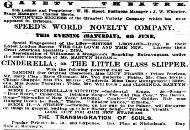AustLit
Latest Issues
AbstractHistoryArchive Description
The book for this version of the popular pantomime story is said to have followed the 'long-accepted lines of the conventional Cinderella revival.' The Sydney Morning Herald review suggests, too, that the production's success was primarily due to Taylor having emphasised 'the salient incidents of the fairy legend... the beacons on the ocean of topical verbiage' (24 December 1894, p.6).
Songs incorporated into the 1894 production, a large number of which were recent successes from London and America, included: 'Alas I do not Know' and 'O That We Two Were Maying' (sung by Ray Jones); 'I Seek For Thee in Every Flower' and 'Sweet Marie' (James Norrie); 'Swim Out, Gormano,' and 'At Trinity Church I Met My Doom' (Horace Wheatley); 'Sligo,' 'Sweet Marie,' and 'Songs My Mother Sang' (James Norrie); 'Musical Madness' (duet by Hagan and Fraser); 'Ours is a Happy Home' (Martin Hagan); 'Out
on The Spree' (Lucy Fraser); and 'Hush-A-Bye, My Little Pickaninny.' Additional musical performances included a 'Clog Hornpipe' (dance by Horace Wheatley), 'The Fairy Apple Blossoms Ballet' and 'The Unique, Red, White and Blue Ballet.'
The 1895 Brisbane season included such songs as 'Little Alabama Coon' (Marie Luella) and the instrumental/dance numbers, 'The Toilet Minuet,' 'The Tricolour Barn Dance' and 'All Nations Ballet.' Other highlights of the production included: 'The Tableaux Vivants Nursery Tales,' 'The Sports Procession "Pan-Britannic Festival"' (which included the 'Champion Lady Cyclists' and 'Popular Jockey's Hornpipe'), 'The Processions of Fairy Toilet Articles,' 'The Brilliant Electric Carriage,' 'The Dazzling Illuminated Palace,' and 'The Death and Burial o' Poor Cock Robin.'
Notes
-
The original production's scenic artists, Goatcher and Gordon, presented numerous visual spectacles - some of which were 'Borders of Fairyland,' 'The Royal Ballroom,' 'The Wealth, Produce and Progress of Australia,' 'The Pearl Fisheries,' and 'Dream of Federation.' The Brisbane Courier suggests that the most exquisite pictorial illustration of all was the transformation scene, representative of the wealth and products of Australia. The critic writes:
'It is from the brush of Phil Goatcher, and depicts colonial progress from primeval forest to federated Australia. There was a forest, tall and wild, out of which pioneers hewed their homes and the primitive teamster tolling over the unmade road, pictures of Ballarat and Broken Hill, and the interior of a gold mine followed succeeded by the Pearl fisheries, with craft lying lazily on a summer sea and concluding with an allegorical scene "United Australia"' (24 May 1895, p.5).
-
The Harlequinade, titled 'Fun in a Kitchen,' was initially performed by the Gregory Troupe and William Hassan. The act was described as being produced 'in the old-fashioned classic style by gesture only' and 'a breathless rally in which [the performers] scrambled in and out of doors and leaped from the top of one architrave to another in quite an exhilarating fashion' (Sydney Morning Herald 24 December. 1894, p.6).
Production Details
-
1894: Lyceum Theatre, Sydney; 22 December 1894 - 25 January 1895
- Director John Wallace; Producer Williamson and Musgrove; Music Director/Conductor/Arranger George Hall; Scenic Art Phil Goatcher and George Gordon; Manager George L. Goodman.
- Cast incl. Ray Jones (Cinderella), James Norrie (Prince Peerless), William Hassan (Cinderella's Cat), Horace Wheatley (Baron Gormano), James J. Hasker (Father Time), Lucy Fraser (Dandini), Linda Henry (Chippi Chappi), Maie Saqui, Lily Everett, Edith Courtney, Ida Ingersoll, F. Duvalli, H. Rowley, F. A. Highland, Gregory Troupe, Ouda (gymnast), Thyer Family (juvenile gymnasts).
1895: Opera House, Brisbane; 22 May - 5 June.
- Cast and production mostly as for previous Sydney season.
- New cast members incl. Katrherin Hardy (Cinderella), Marie Luella (Prince Peerless).
- Cast members not identified in the Sydney season but appearing in Brisbane include: Martyn Hagen (Clorinda), Harry Steele (Thisbe), John Wallace (Pickles, menial to the house of Gormano).
1896: Gaiety Theatre, Brisbane; 6-12 June.
- Director Martyn Hagan; Producer W. H. (Billy) Speed; Business Manager J. W. Wheeler.
- Troupe: W. H. Speed's World Novelty Company.
- Cast incl. Daisy Montgomery (Cinderella), Martyn Hagan (Clorinda), Lucy Fraser (Dandini), Harry Clay (Prince Peerless), Ted Herberte (Baron Gormano), Charles Bovis (Pickles), Flo Murray (Chipple Chapple), Jessie Thornton (Elfinella), Will Bovis (Thisbe), Sister Leonard.
Publication Details of Only Known VersionEarliest 2 Known Versions of
Works about this Work
-
Gaiety Theatre
1896
single work
review
— Appears in: The Brisbane Courier , 8 June 1896; (p. 2)
— Review of Cinderella and the Little Glass Slipper 1894 single work musical theatre -
Opera House : 'Cinderella'
1896
single work
review
— Appears in: The Brisbane Courier , 24 May 1896; (p. 5)
— Review of Cinderella and the Little Glass Slipper 1894 single work musical theatre -
Musical and Dramatic Notes
1894
single work
review
— Appears in: The Sydney Morning Herald , 8 December 1894; (p. 5)
— Review of Cinderella and the Little Glass Slipper 1894 single work musical theatre -
Lyceum - 'Cinderella'
1894
single work
review
— Appears in: The Sydney Morning Herald , 24 December 1894; (p. 6)
— Review of Cinderella and the Little Glass Slipper 1894 single work musical theatre
-
Lyceum - 'Cinderella'
1894
single work
review
— Appears in: The Sydney Morning Herald , 24 December 1894; (p. 6)
— Review of Cinderella and the Little Glass Slipper 1894 single work musical theatre -
Opera House : 'Cinderella'
1896
single work
review
— Appears in: The Brisbane Courier , 24 May 1896; (p. 5)
— Review of Cinderella and the Little Glass Slipper 1894 single work musical theatre -
Musical and Dramatic Notes
1894
single work
review
— Appears in: The Sydney Morning Herald , 8 December 1894; (p. 5)
— Review of Cinderella and the Little Glass Slipper 1894 single work musical theatre -
Gaiety Theatre
1896
single work
review
— Appears in: The Brisbane Courier , 8 June 1896; (p. 2)
— Review of Cinderella and the Little Glass Slipper 1894 single work musical theatre




